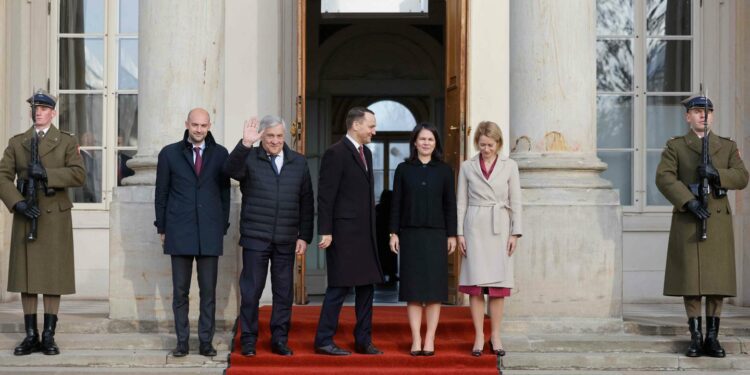Faced with Donald Trump’s return to the White House on January 20, 2025, the Europeans are determined to take on a greater share of the burden with their collective defense. Meeting in Warsaw on Tuesday, November 19, the foreign ministers of the European Union’s five largest countries – Germany, France, Italy, Spain and Poland – together with that of the United Kingdom, pledged to “play a still greater role in ensuring our own security [and] to stand united with our transatlantic partners,” as they put it in their final declaration.
Since his first term, which began in 2016, the president-elect has been calling for Europeans to spend more on their own defense. The latter are expecting similar, if not tougher, rhetoric in his second term. With this in mind, they are already promising to increase their “security and defense spending, in line with [their] previous commitments, while reaffirming that, in many cases, spending beyond 2% of gross domestic product will be needed to address rising threats to security.” In recent months there has even been talk of setting a new spending target within NATO at 3% of GDP, which would require a major new financial effort.
Since the outbreak of the Russian invasion of Ukraine, Europeans have already made major budgetary efforts. In 2024, 23 of the 32 NATO allies have spent at least 2% of their GDP on defense, and the 27 member states, on average, 1.9% of their GDP. There are significant differences, however, between Poland and Lithuania, which have now invested more than 4% of their GDP on defense, and Italy, which has stagnated at 1.5% of its GDP, and Spain, which devoted just 1.3% of its GDP.
European loan
According to data published on Tuesday by the European Defense Agency, by 2024 European countries will have invested some €326 billion in defense, compared with €240 billion in 2022, a leap of a third over the period. And defense industries have noticed the difference. According to data from ASD, the European lobby for defense companies, their sales rose by 17% in 2023, to the sum of 158.8 billion euros, demonstrating that companies based on the Old Continent are capturing part of the new investments.
European leaders are nevertheless calling for more to be done. “The war against Ukraine has shown us that we need to strengthen our defense capabilities,” said EU foreign policy chief Josep Borrell on Tuesday following a meeting with European defense ministers. NATO’s new Secretary General, Mark Rutte, was also present, with the same message. At the end of June, the Commission president, Ursula von der Leyen, stated that an effort of 500 billion euros over 10 years was needed to make up for the investment backlog. According to her, when Europe increases its spending by a third, China increases it by 600% and Russia by 300%.
You have 49.44% of this article left to read. The rest is for subscribers only.
Source link : http://www.bing.com/news/apiclick.aspx?ref=FexRss&aid=&tid=673fe484edcf412a85eea7d1e0d15494&url=https%3A%2F%2Fwww.lemonde.fr%2Fen%2Finternational%2Farticle%2F2024%2F11%2F22%2Fin-the-eu-the-debate-on-the-financing-of-the-defense-effort-is-back-on-the-agenda_6733651_4.html&c=6213635638983498239&mkt=de-de
Author :
Publish date : 2024-11-21 14:33:00
Copyright for syndicated content belongs to the linked Source.


